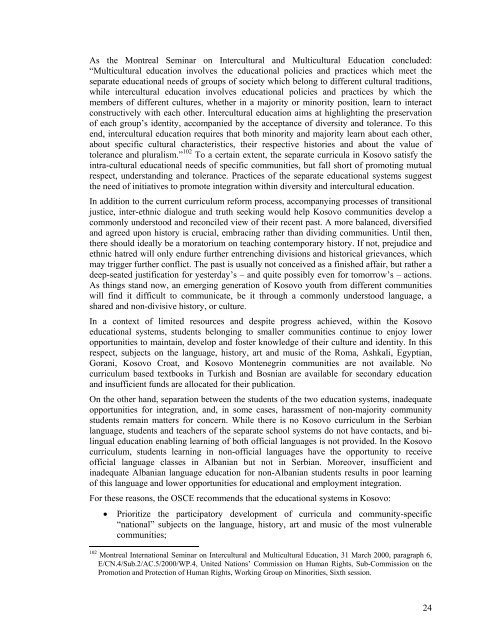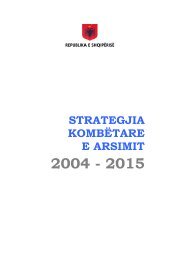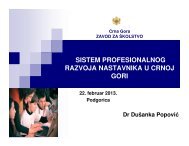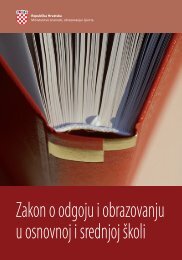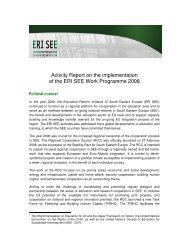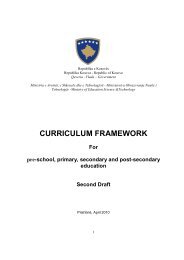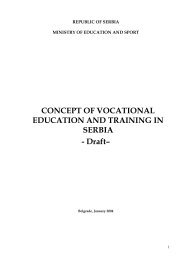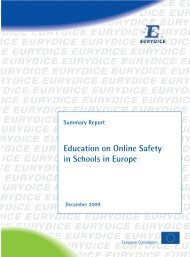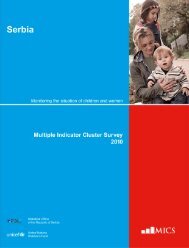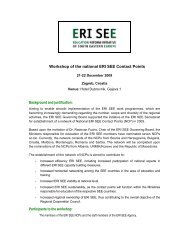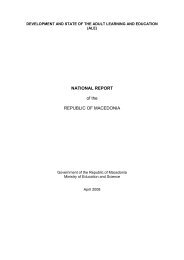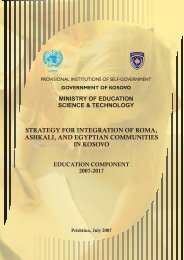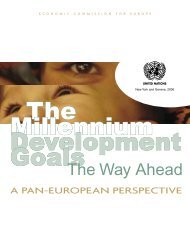Kosovo non-majority communities within the primary and ... - OSCE
Kosovo non-majority communities within the primary and ... - OSCE
Kosovo non-majority communities within the primary and ... - OSCE
Create successful ePaper yourself
Turn your PDF publications into a flip-book with our unique Google optimized e-Paper software.
As <strong>the</strong> Montreal Seminar on Intercultural <strong>and</strong> Multicultural Education concluded:“Multicultural education involves <strong>the</strong> educational policies <strong>and</strong> practices which meet <strong>the</strong>separate educational needs of groups of society which belong to different cultural traditions,while intercultural education involves educational policies <strong>and</strong> practices by which <strong>the</strong>members of different cultures, whe<strong>the</strong>r in a <strong>majority</strong> or minority position, learn to interactconstructively with each o<strong>the</strong>r. Intercultural education aims at highlighting <strong>the</strong> preservationof each group’s identity, accompanied by <strong>the</strong> acceptance of diversity <strong>and</strong> tolerance. To thisend, intercultural education requires that both minority <strong>and</strong> <strong>majority</strong> learn about each o<strong>the</strong>r,about specific cultural characteristics, <strong>the</strong>ir respective histories <strong>and</strong> about <strong>the</strong> value oftolerance <strong>and</strong> pluralism.” 102 To a certain extent, <strong>the</strong> separate curricula in <strong>Kosovo</strong> satisfy <strong>the</strong>intra-cultural educational needs of specific <strong>communities</strong>, but fall short of promoting mutualrespect, underst<strong>and</strong>ing <strong>and</strong> tolerance. Practices of <strong>the</strong> separate educational systems suggest<strong>the</strong> need of initiatives to promote integration <strong>within</strong> diversity <strong>and</strong> intercultural education.In addition to <strong>the</strong> current curriculum reform process, accompanying processes of transitionaljustice, inter-ethnic dialogue <strong>and</strong> truth seeking would help <strong>Kosovo</strong> <strong>communities</strong> develop acommonly understood <strong>and</strong> reconciled view of <strong>the</strong>ir recent past. A more balanced, diversified<strong>and</strong> agreed upon history is crucial, embracing ra<strong>the</strong>r than dividing <strong>communities</strong>. Until <strong>the</strong>n,<strong>the</strong>re should ideally be a moratorium on teaching contemporary history. If not, prejudice <strong>and</strong>ethnic hatred will only endure fur<strong>the</strong>r entrenching divisions <strong>and</strong> historical grievances, whichmay trigger fur<strong>the</strong>r conflict. The past is usually not conceived as a finished affair, but ra<strong>the</strong>r adeep-seated justification for yesterday’s – <strong>and</strong> quite possibly even for tomorrow’s – actions.As things st<strong>and</strong> now, an emerging generation of <strong>Kosovo</strong> youth from different <strong>communities</strong>will find it difficult to communicate, be it through a commonly understood language, ashared <strong>and</strong> <strong>non</strong>-divisive history, or culture.In a context of limited resources <strong>and</strong> despite progress achieved, <strong>within</strong> <strong>the</strong> <strong>Kosovo</strong>educational systems, students belonging to smaller <strong>communities</strong> continue to enjoy loweropportunities to maintain, develop <strong>and</strong> foster knowledge of <strong>the</strong>ir culture <strong>and</strong> identity. In thisrespect, subjects on <strong>the</strong> language, history, art <strong>and</strong> music of <strong>the</strong> Roma, Ashkali, Egyptian,Gorani, <strong>Kosovo</strong> Croat, <strong>and</strong> <strong>Kosovo</strong> Montenegrin <strong>communities</strong> are not available. Nocurriculum based textbooks in Turkish <strong>and</strong> Bosnian are available for secondary education<strong>and</strong> insufficient funds are allocated for <strong>the</strong>ir publication.On <strong>the</strong> o<strong>the</strong>r h<strong>and</strong>, separation between <strong>the</strong> students of <strong>the</strong> two education systems, inadequateopportunities for integration, <strong>and</strong>, in some cases, harassment of <strong>non</strong>-<strong>majority</strong> communitystudents remain matters for concern. While <strong>the</strong>re is no <strong>Kosovo</strong> curriculum in <strong>the</strong> Serbianlanguage, students <strong>and</strong> teachers of <strong>the</strong> separate school systems do not have contacts, <strong>and</strong> bilingualeducation enabling learning of both official languages is not provided. In <strong>the</strong> <strong>Kosovo</strong>curriculum, students learning in <strong>non</strong>-official languages have <strong>the</strong> opportunity to receiveofficial language classes in Albanian but not in Serbian. Moreover, insufficient <strong>and</strong>inadequate Albanian language education for <strong>non</strong>-Albanian students results in poor learningof this language <strong>and</strong> lower opportunities for educational <strong>and</strong> employment integration.For <strong>the</strong>se reasons, <strong>the</strong> <strong>OSCE</strong> recommends that <strong>the</strong> educational systems in <strong>Kosovo</strong>:• Prioritize <strong>the</strong> participatory development of curricula <strong>and</strong> community-specific“national” subjects on <strong>the</strong> language, history, art <strong>and</strong> music of <strong>the</strong> most vulnerable<strong>communities</strong>;102 Montreal International Seminar on Intercultural <strong>and</strong> Multicultural Education, 31 March 2000, paragraph 6,E/CN.4/Sub.2/AC.5/2000/WP.4, United Nations’ Commission on Human Rights, Sub-Commission on <strong>the</strong>Promotion <strong>and</strong> Protection of Human Rights, Working Group on Minorities, Sixth session.24


